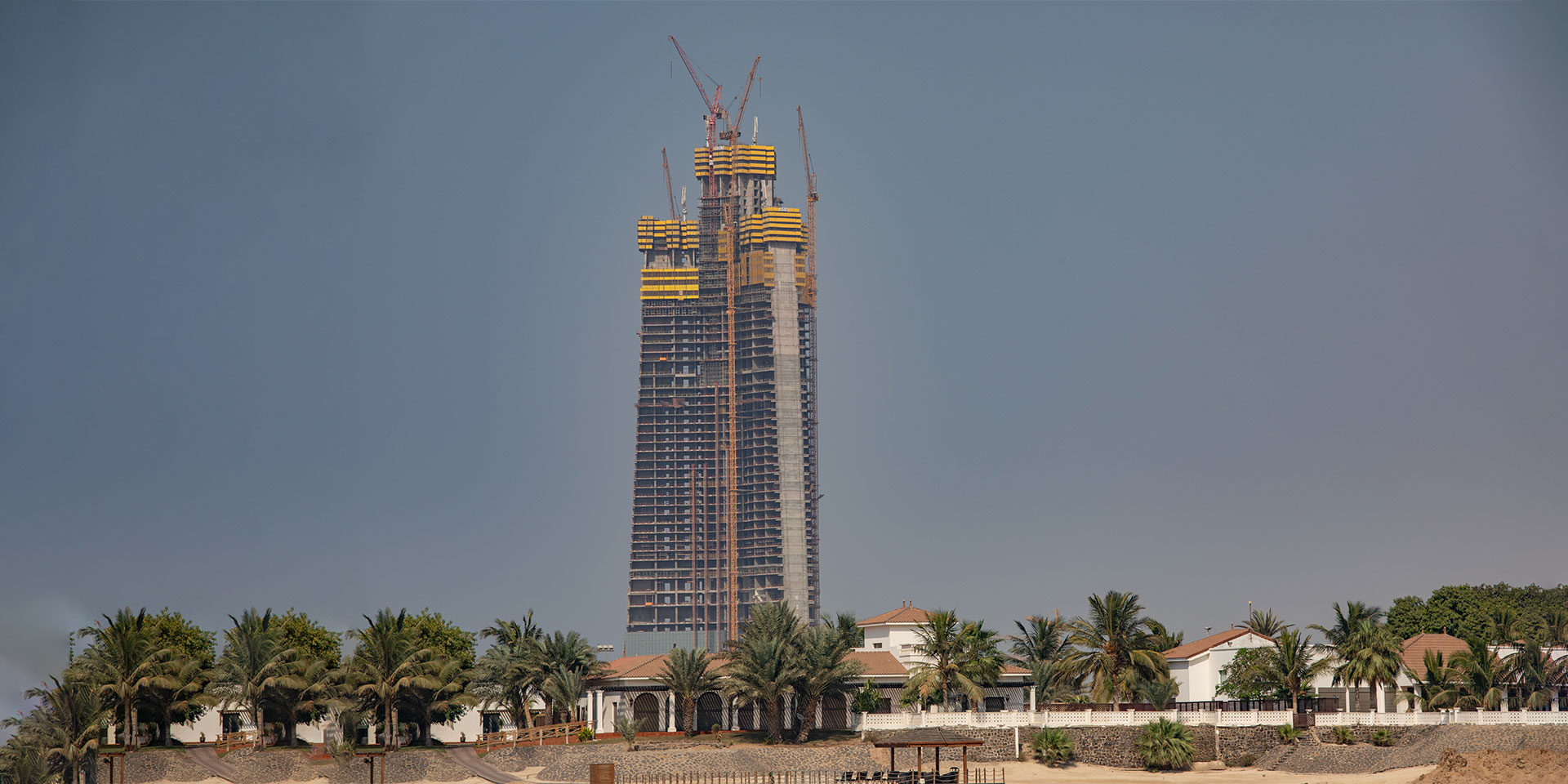Jeddah is different, at least according to its city motto. This Saudi Arabian port city on the Red Sea is home to more than 4 million people and is a gateway to Mecca: the holiest city in Islam. Millions of pilgrims come through Jeddah to visit Mecca, some 65 kilometres to the east, and Medina, Islam’s second holiest city, 360km to the north.
Jeddah’s aspirations are demonstrated by their plans to build a “great” tower, usurping the Burj Khalifa as the world’s tallest building. Construction of Jeddah’s tower started in 2013 with planning, investing and fundraising commencing before that. The Jeddah Tower (formerly Kingdom Tower) is set to be the first skyscraper in the world to reach 1km in height. Only about a third of what will be the tallest building in the world has been completed; construction of the tower halted in 2018 after the Saudi Arabian purge—a mass arrest of politicians, princes and business people.
The purge was labelled by the ruling family as an anti-corruption campaign; however, 200 more people were arrested as recently as August 2021. According to Al Jazeera, “Saudi nationals have long complained of rampant corruption in government and of public funds being squandered or misused by those in power.”
With the current political instability and internal machinations, it is hard to see how construction will proceed to completion. Despite this, the developer, Thornton Tomasetti, still confidently asserts the tower will one day be finished.
“Rising out of the desert at an expected construction cost of $US1.2 billion, Jeddah Tower will offer a luxury hotel, serviced apartments and condominiums, as well as prestigious office space. The 530,000m2 tower will anchor Kingdom City, a new $US20 billion multi-use urban development.”
According to a BBC report, the future of skyscrapers in general is in jeopardy. There is worldwide decreasing interest in high-density urban living since COVID-19 and empty offices have become the norm in cities around the world (although the report acknowledges that high-rises were also declared dead after 9/11 but that there have been more built in the past 20 years than before).
For now, the foundations of the tower jut into the desert air: a monument to failed human ego and ambition.
Another concern around the construction of the tower of Jeddah is the exploitation of immigrant workers. Amnesty International has called out the poor treatment of low-skilled immigrant workers in the Arabian Gulf countries. The sad reality is that these kinds of workers are the ones often used and abused in construction projects such as this.
A tower to heaven
There is a story in the Bible that comes from the same region and has many parallels with the story of Jeddah. It is a story about a tower that was meant to be the tallest ever built. Similarly, it is also a tower that was never finished, just like the Jeddah Tower. Biblical sources tie the building of the Tower of Babel to a powerful king named Nimrod. There are suggestions of this powerful king exploiting labour to build the project as well as using the project to turn humanity away from God.
“Then they said, ‘Come, let us build ourselves a city, with a tower that reaches to the heavens, so that we may make a name for ourselves; otherwise we will be scattered over the face of the whole earth’” (Genesis 11:4).
In the biblical account, God comes down to witness this great building project. With the possibility of the exploitation and evil expanding as humanity is working together, God confuses the workers’ languages and they all go their separate ways, fulfilling God’s commission of Genesis 1:28 to take care of the earth and multiply across it.
Thinkers and scholars have theorised over what the Tower of Babel represented for thousands of years. While theories range from practical to outlandish, there is a common theme—pride and exploitation. Some suggest that those with memory of the Flood (Genesis 7) were trying to build a structure that could withstand a future cataclysm.
Other commentators note that because trees and high mountains are symbolic in the Bible as a meeting point between heaven (divinity) and earth (humanity), the tower represented a symbol of a mountain, with humankind striving to reach an equal footing with God. Through this man-made tower, they were attempting to replace the divine with the human. As Judith Dupre, author of Skyscrapers: A History of the World’s Most Extraordinary Buildings, says: “Skyscrapers convey power, economic might, and technical prowess—attributes that are irresistible to nation builders.”
The Tower of Babel is an important story, as it sets up a theme that appears again and again throughout the rest of the Bible.
Both the ancient and modern stories remind us that while human beings are capable of incredible and unbelievable feats, it is always helpful to stay humble. Pride can often tempt us to replace the divine, God or even transcendent things with ourselves. The ancient Greeks are thought to have coined the phrase “hubris” to describe this exact concept. Excessive pride, especially in the face of the gods, always leads to divine retribution in the case of Greek tragedies. In the real world, disregard for the divine and elevation of self always leads us to hurt others, and ultimately ourselves.
Taking pride in our achievements is not a problem but allowing pride to drive us to compete with and compare ourselves to others is something that often leads to embarrassment, as well as other more serious consequences. It can also lead us to exploit and manipulate others in order to achieve our goals. A repeated theme advocated for by biblical prophets is protection for the disadvantaged, such as in Ezekiel 34:10–16, and for foreigners, as in Amos 7:22–24.
Another common biblical theme is the reversal of the disruption and separation of nations. In the book of Acts, at the beginning of the Christian movement, there is a moment when the disciples are together, waiting for a symbol or sign that the time is right to take their message of hope and healing to the world. In an act that reverses the “curse” of Babel, the book records that the Spirit of God comes upon everyone who is present in the room, praying and waiting, and they begin to share the good news of Jesus with those on the surrounding streets.
The crazy thing is that everyone who hears them understands the message in their own native language. At that time in Jerusalem there were men and women travelling from every corner of the Roman empire. Some of those who hear the commotion make fun of the apostles, claiming they are drunk. But others hear the message of God and are convinced that this God is worthy of their wholehearted devotion.
The apostle Peter claims the promise in the book of Joel that says “I will pour out my spirit on all people”, and that “everyone who calls on the name of the Lord will be saved”. Luke, who wrote the book of Acts, tells us that “about 3000 were added to their number that day”. Can you imagine speaking to a crowd and having that many people commit to what you are saying?
In the final book of the Bible, Revelation, the prophet John looks forward to the day when humanity has access to the Tree of Life which is “for the healing of the nations” (Revelation 22:2). The biblical story imagines a future where all people are brought together and regain access to God’s love and presence at the foot of a life-giving tree.
If it wasn’t clear before, it should be now that the biblical story is an invitation extended to people of all nations, languages and tribes to become part of God’s family.
While the tower of Jeddah may never be finished, just like the tower of Babel, both situations are emblematic. They remind us to stay humble, protect the innocent, treat those who are different to us respectfully, and to ultimately accept the invitation to become part of God’s inclusive, accepting family.
In my church and many others, I see the active reversal of the curse of Babel as people from every nation, language group and people come together and try to love one another. If you haven’t found yourself a group like that, I encourage you to seek one out today.
Jarrod Stackelroth is the editor of Signs of the Times Australia/New Zealand and Adventist Record. A version of this article first appeared on the Signs of the Times Australia website and is republished with permission.



















